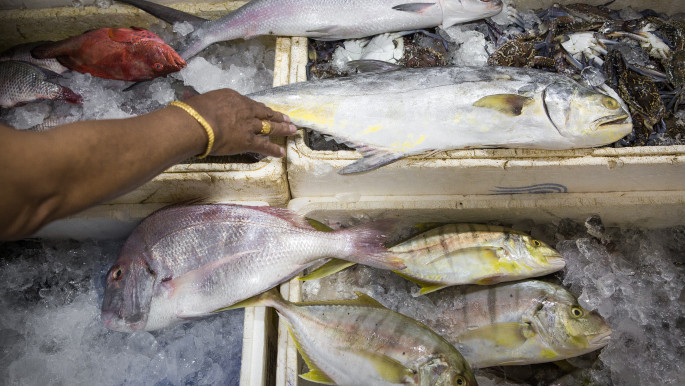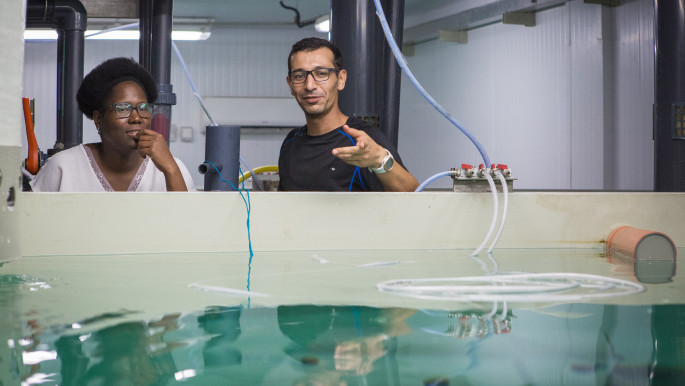Surrounded by sea, Qatar explores fish farming
Nested at the edges of a remote plain in the outskirts of Al Khor, a newly constructed US $65 million scientific institution stands at the forefront of Qatar's upcoming aquaculture industry.
Due to open early 2020, the Aquatic Fisheries and Research Centre targets an annual production of 2.4 million half-subsidised fingerlings in order to supply commercial aquafarms which expect to produce up to 7,000 tons of marine fishes and shrimps a year.
Additionally, the institution leads researches on how best to adapt the latest technologies to the farming of local species, whilst a consultancy office contracted by the Ministry of Municipality and Environment (MME) carries out experiments on economic feasibility.
Qatar's annual fish consumption of 22.3 kg per capita outreaches the production capacities of local fisheries, which have nevertheless tripled in volume over the past two decades.
To safeguard its fish reserves from depletion, Qatar enforces a ban on trawlers, stopped issuing new fishing licenses and imposes 'a ceiling on fish catch from the sea' at 14,000 tons a year.
In this context, representatives of the Fish Wealth Department at the MME believe aquafarming to be, with importations, 'the only way' to cover an increasingly growing demand for seafood products as the population has quadrupled since 1999.
 |
|
| A poster that picture the fishes of Qatar can be seen in Al Wakra Fish Market, Qatar [Sebastian Castelier] |
 |
|
| Customers roam around a fish market in Al Wakrah, Qatar [Sebastian Castelier] |
Off-shore floating cages
In the northern sector of Qatar's waters, a project launched in December 2017 by Al Qamra Holding Group develops offshore floating cages with an ambition to produce 2,000 tons of marine fishes shortly.
In the years to come, two additional farms for fishes and one for shrimps are expected to be launched too, yet, to date, commercial production has not started.
Set to complement importations and traditional fisheries in the medium term, Qatar's aquacultural sector focuses on fish fattening, a process which consists of feeding fingerlings supplied by the Aquatic Fisheries and Research Centre until they reach optimal market size.
 |
|
| Marine scientist Catherine Minot stands next to her biosecurity supervisor, Mohamed at the Aquatic Fisheries and Research Centre, a Qatari public institution located in Ras Matbakh to develop a full-fledged aquaculture sector [Sebastian Castelier] |
 |
|
| The Aquatic Fisheries and Research Centre is a Qatari public institution located in Ras Matbakh to develop a full-fledged aquaculture sector [Sebastian Castelier] |
A report foresees a reduction of seafood imports in the Gulf countries while the regional fishing industry is 'expected to grow' by more than seven percent a year between 2018 and 2024.
Aware that aquafarming has triggered conflict with local fisheries in some parts of the world, Qatari authorities have reached out to fishermen to 'explain the importance of aquafarming' at a time when 'more than 85 percent' of popular fish in the Arabian Gulf have gone extinct, Inside Arabia reports.
In return, the Aquatic Fisheries and Research Centre has agreed to periodically release fingerlings into the territorial waters to repopulate depleting stocks. Similar fish stock enhancements already took place from 1998 to 2000, in 2002 and 2009.
In agreement with local fishermen, Qatar's aquaculturists will breed local species, such as silvery black porgy, yellow-finned sea bream, white-spotted spine foot and orange-spotted grouper.
"Local species are the way to go," emphasises the Director of the aquaculture programme at the World Wildlife Fund (WWF), Aaron A. McNevin, in an interview with The New Arab.
Yet, consumers remain concerned over the possible use of growth hormones by fish farms. MME officials offer reassurance that growth hormones and some antibiotics are banned in Qatar, in line with international best practices.
In the meantime, Qatar has announced a partnership with a UK aquatic centre to 'develop legislation for regulating fish farming'.
Sustainable fish farming?
As Qatar's fish farming industry is expected to quick off, Aaron A. McNevin tempers the enthusiasm of local officials who link aquaculture to sustaining fish stocks.
"Aquaculture does no service to our oceans if it is using more fish for feed than the amount of farm product harvested. Carnivorous fish are not ideal in an increasingly resource-scarce world," he said.
Indeed, to produce highly-priced premium fishes with high consumer appeal, the aquafarming industry often relies on feed made of low-value fishes. The MME indicates that production of seven tons of fish in Qatar would require approximately 11 tons of fish meal.
Even so, the Fish Wealth Department acknowledges that high-value carnivorous marine fishes remain at the heart of Qatar's ambitions in aquaculture since 'they can be sold at a good price, unlike herbivorous species'.
The representative also admits that aquafarmers oftentimes give priority to short-term profits over long-term environmental sustainability.
Although Qatari officials regret the impact of fish meal production on global marine ecosystems, they indicate to be helpless to tackle what is known to be a decade-long global issue and calls on fish meal producers to act, "we are just beginner, we are not a big player."
At the Aquatic Fisheries and Research Centre, its director, Mohammed Mahmoud Al Abdullah, invites entrepreneurs to farm tilapia, an inexpensive herbivorous freshwater fish frequently consumed throughout Asia. Indeed, foreign citizens account for 88 percent of Qatar's population, a majority from India, Bangladesh, Nepal, Pakistan and the Philippines.
Sitting at his desk, Al Abdullah reaffirms Qatar's commitment to preserving its environment.
"We do not plan to export any aquaculture production since it would benefit a handful of people only. I will never let someone make profits at the cost of Qatar's natural resources."



